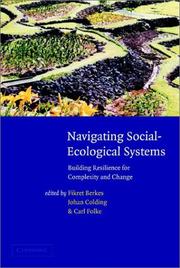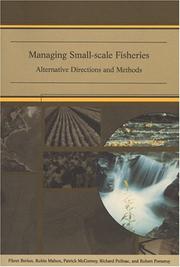| Listing 1 - 2 of 2 |
Sort by
|

ISBN: 9780521815925 9780511541957 9780521061841 0521061849 0521815924 1107134226 0511177941 0511065094 0511058764 0511305338 0511541953 1280419970 1139148303 0511073550 9780511065095 9780511177941 9780511073557 9781280419973 9786610419975 6610419973 Year: 2003 Publisher: Cambridge New York Cambridge University Press
Abstract | Keywords | Export | Availability | Bookmark
 Loading...
Loading...Choose an application
- Reference Manager
- EndNote
- RefWorks (Direct export to RefWorks)
In the effort towards sustainability, it has become increasingly important to develop conceptual frames to understand the dynamics of social and ecological systems. Drawing on complex systems theory, this book investigates how human societies deal with change in linked social-ecological systems, and build capacity to adapt to change. The concept of resilience is central in this context. Resilient social-ecological systems have the potential to sustain development by responding to and shaping change in a manner that does not lead to loss of future options. Resilient systems also provide capacity for renewal and innovation in the face of rapid transformation and crisis. The term navigating in the title is meant to capture this dynamic process. Case studies and examples from several geographic areas, cultures and resource types are included, merging forefront research from natural sciences, social sciences and the humanities into a common framework for new insights on sustainability.
502.31 --- 502.31 Interaction, interdependence of nature and society. Mutual benefits etc. --- Interaction, interdependence of nature and society. Mutual benefits etc. --- Social ecology --- Human ecology --- Ecosystem management --- Environmental policy --- Sustainable development --- System theory --- Ecologie sociale --- Ecologie humaine --- Ecosystèmes --- Environnement --- Développement durable --- Théorie des systèmes --- Philosophy --- Philosophie --- Gestion --- Politique gouvernementale --- Life Sciences --- General and Others --- Social ecology. --- Ecosystem management. --- Environmental policy. --- Sustainable development. --- System theory. --- Resilience (Ecology) --- Philosophy. --- Ecological resilience --- Ecosystem resilience --- Ecology --- Systems, Theory of --- Systems science --- Science --- Development, Sustainable --- Ecologically sustainable development --- Economic development, Sustainable --- Economic sustainability --- ESD (Ecologically sustainable development) --- Smart growth --- Sustainable economic development --- Economic development --- Environment and state --- Environmental control --- Environmental management --- Environmental protection --- Environmental quality --- State and environment --- Environmental auditing --- Biotic communities --- Ecosystems management --- Applied ecology --- Nature conservation --- Biodiversity conservation --- Ecology, Social --- Environment, Human --- Human ecology (Social sciences) --- Human environment --- Social sciences --- Environmental aspects --- Government policy --- Management

ISBN: 1280850086 9786610850082 0001552503103 1552503103 1552503011 0889369437 9780889369436 9781552503010 Year: 2001 Publisher: Ottawa, Ont., Canada
Abstract | Keywords | Export | Availability | Bookmark
 Loading...
Loading...Choose an application
- Reference Manager
- EndNote
- RefWorks (Direct export to RefWorks)
Human dependence on marine and coastal resources is increasing. Today, small-scale fisheries employ 50 of the world's 51 million fishers, practically all of whom are from developing countries. And together, they produce more than half of the world's annual marine fish catch of 98 million tonnes, supplying most of the fish consumed in the developing world. At the same time, increased fishery overexploitation and habitat degradation are threatening the Earth's coastal and marine resources. Most small-scale fisheries have not been well managed, if they have been managed at all. Existing approaches have failed to constrain fishing capacity or to manage conflict. They have not kept pace with technology or with the driving forces of economics, population growth, demand for food, and poverty. Worldwide, the management and governance of small-scale fisheries is in urgent need of reform.
Small-scale fisheries. --- Fishery management --- Artisanal fisheries --- Artisanal fishing --- Small-scale fishing --- Fisheries --- Fish management --- Fisheries management --- Fishery resources --- Aquatic resources --- Wildlife management --- Fish counting towers --- Overfishing --- Management
| Listing 1 - 2 of 2 |
Sort by
|

 Search
Search Feedback
Feedback About UniCat
About UniCat  Help
Help News
News